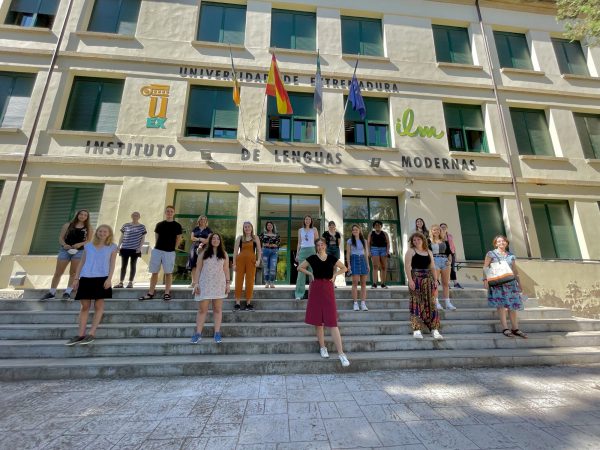
de Extremadura in Caceras, Spain. Photo by Resident Director Victoria Pineda.
When COVID-19 forced Kalamazoo College to pause its study abroad programs last year, many juniors feared they would lose out on a life-changing opportunity. Delaying it a year is usually not possible with academic obstacles. Plus, varied pandemic protocols continue to make it difficult for students to travel at all.
“If you think about the preparations, the considerations and the protocols that we had to implement for students to be on campus in the last year, just multiply that by 50 for study abroad,” Center for International Programs (CIP) Executive Director Margaret Wiedenhoeft said. “It’s one thing for our international partners to have an academic plan. It’s another to think about all the components and putting them together to offer a meaningful program.”
However, students still had hope and refused to give up.
“When they realized they wouldn’t be going abroad as juniors, we had quite a few determined students who said, ‘I’m going as a senior. How do I make this work?’” Wiedenhoeft said.
Combine that desire with a flexible faculty that recognizes the importance of international immersion, plus a lot of hard work from the CIP, and K had a game plan to restart study abroad, especially for this year’s seniors. Their combined efforts and the availability of international partners are allowing about 50 seniors, in addition to the regular batch of juniors, to go abroad—about 161 students in total in study abroad and study away. That’s proving to be a point of pride at K and a significant number for any Great Lakes Colleges Association (GLCA) school.
“When I talk to my colleagues at other colleges and I tell them how many students we have abroad, their responses are genuinely full of joy and envy for these students,” Wiedenhoeft said. “There are other schools sending students abroad right now, but we definitely have a significantly higher number of students going abroad compared to our peers.”
More than 50 study abroad programs are typically available to K students and most of them are open again by meeting local protocols and health restrictions. Programs this year include two interim opportunities in Lyon, France, and Lüneburg, Germany, which might at some point become yearly destinations. There also are more permanent options opening for the first time in London and Belfast, which are launching a year late because of the COVID-19 hiatus.
Wiedenhoeft said the united effort across campus to make these programs possible should help newer students see the importance of visiting the CIP early and often should they desire a study abroad opportunity.
“I think this underscores our willingness to be flexible and support students who want to include a study abroad component as part of their experience at K,” she said. “It may not be exactly what the student had initially planned when they first arrived. But for students who are flexible and willing to adjust some of their expectations, we can do our best to work with students and make sure that they achieve that goal of getting off campus.”
Wiedenhoeft added students largely have expressed gratitude over study abroad restarting and their experiences, especially the seniors, even when additional COVID-19 protocols are required. For example, students who are now in Thailand and South Korea had to quarantine at a hotel for two weeks for the sake of public health laws.
“That speaks to the type of students we have at K,” she said. “They’ve demonstrated a lot of adaptability and flexibility. As it got closer, they got very excited and we were giving them very specific instructions. I think those instructions made it more intimidating to think about traveling. But the students we’ve heard from, including those who had to quarantine, are just excited to be abroad.”

